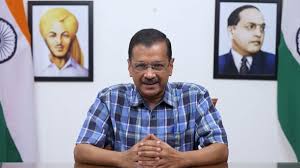
Delhi Chief Minister Arvind Kejriwal surrendered himself to Tihar jail following the conclusion of Lok Sabha elections and the expiration of his interim bail. His journey to jail was not direct; he first visited Rajghat to honor Mahatma Gandhi, then the Hanuman mandir, and finally, the Aam Aadmi Party headquarters before heading to jail, where he had been released on interim bail by the Supreme Court 21 days prior.
Addressing party workers at the Aam Aadmi Party headquarters, Kejriwal expressed gratitude to the Supreme Court for the interim bail period, which he utilized fully by engaging in campaign activities across various parties and advocating for the country’s well-being.
He highlighted Prime Minister Narendra Modi’s acknowledgment of lacking evidence against him during the campaign, emphasizing the need to combat what he termed as a dictatorial regime. Kejriwal criticized the central government’s actions, questioning the incarceration of a Chief Minister without substantial evidence in a government with a significant majority.
Accompanied by his wife Sunita Kejriwal and party leaders, Kejriwal’s return to jail comes in the context of his involvement in the Delhi liquor policy case, leading to his initial arrest on April 1 until he obtained relief from the Supreme Court.
His previous stay in Tihar was marked by controversy over his health, with allegations that authorities had withheld medication. Kejriwal’s concerns about his treatment and the situation’s uncertainty were evident as he expressed uncertainty about the treatment he might receive this time.
The event underscores Kejriwal’s stance against what he perceives as an authoritarian regime, stating, “When power becomes dictatorship, jail becomes a responsibility,” reflecting his commitment to political activism despite legal challenges.
Sources By Agencies




